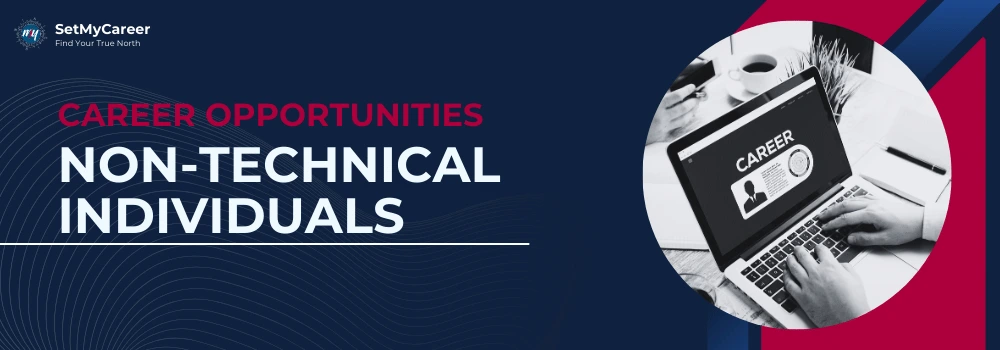Published by Jyothi Patil on 21 July 2023
Content Strategist | Editorial Team Member
Jyothi Patil is a skilled writer with a strong background in English literature, which she applies to crafting engaging content across various platforms. From writing blogs for her website and guest posts to creating pieces on Medium and Substack, Jyothi excels in making complex ideas easy to understand.
Explore the key differences between technical and non-technical pros, plus 15 high-paying career opportunities for non-technical executives!

In the digital age, technical skills seem indispensable across industries, but there is a plethora of promising opportunities that still exist for non-technical professionals. While technical roles focus on areas like engineering, programming and information technology, several non-technical Career Path leverage soft skills like creativity, relationship-building, communication and business acumen.
With industries expanding and specializing, diverse non-technical roles drive innovation, growth and efficiency across public and private sector organizations.
The difference? Those with clearly defined Career Goals manifest professional visions into reality through targeted objectives and actionable plans.
This makes it an apt time for non-technical individuals to capitalize on strengths like imaginative thinking, emotional intelligence, design expertise and strategic vision to deliver value in evolving markets.
Surprisingly, many young Gen-Z and millennial working professionals prefer skill-building in both; technical and non-technical fields of work. For example, someone with an educational background in computer science now thrives to build graphic design skills, and those with a writer’s profession are now learning basic coding. In the end, it’s not about which field is superior to the other, it’s about how harmoniously they can co-exist.
In this article, we will dive deeper into understanding the primary difference between technical and non-technical fields and 15 top career opportunities non-technical executives can explore.
Before going further, it helps to contrast career goals against performance goals we may be more familiar with, especially when exploring the best courses after 12th to align with future aspirations.
| Technical Fields | Non-technical Fields |
|---|---|
| Focus on science, technology, engineering, mathematics, medical fields, emerging IT fields, etc. | Leverage soft skills like creativity, communication, empathy, people management, etc. |
| Require specific hard skills and technical expertise. | Emphasize interpersonal abilities, EQ and design thinking. |
| Involve working on machinery, systems and technical problems. | Centred on understanding people, businesses and strategy. |
| Roles like software developers, data scientists, and engineers. | Roles in marketing, consulting, writing and design. |
| In-demand technical skills: coding, AI, data analytics, automation. | Critical soft skills: collaboration, persuasion, emotional intelligence, interpersonal skills. |
| Careers progress with emerging technologies, depending on scientific advancements. | Careers evolve with changing business landscapes, depending on changing markets and economies. |
| Technical degree/certification necessary to secure any career opportunities in tech. | Interdisciplinary education and mindsets are valued, along with educational degrees. |

There are plenty of high-paying non-tech careers waiting for you.
Start Exploring TodayAdvise organizations on strategy, operations, process excellence and organizational change management. Identify areas for business improvement and develop solutions.
Create online marketing campaigns across social, search and other channels to promote business, engage customers, and drive website traffic.
Identify new business opportunities through market research, analyze M&A targets, and establish strategic partnerships to drive growth
Evaluate business processes and policies to improve efficiency, and productivity and boost organizational performance.
A technical content writer is someone who create user manuals, online help guides, training materials and operating instructions for software/hardware products.
Handle financial planning, budgeting, compliance audit, taxation and managing cash flows of small and big companies.
For someone who has a way with words. Creating engaging long/short-form content for brands and digital marketing for developing & maintaining a strong brand identity is the core task.
Manage recruiting, training, employee development and engagement. Additionally, one can venture into areas like compensation and benefits, D&I, organizational behavior, etc.
Conceptualize creative advertisement campaigns across traditional and digital media. A rapidly exponentially growing field, owing to the emerging importance of social media.
Manage communications and reputation of brands/individuals. PR for corporations focuses on maintaining a positive corporate image while handling media requests and inquiries.
Gather consumer insights through surveys, and focus groups to guide decisions to help businesses with surveys, research, project reports, funding opportunities, etc.
Manage recruiting, training, employee development and engagement. Additionally, one can venture into areas like compensation and benefits, D&I, organizational behavior, etc.
Create logos, branding assets, and marketing collateral for clients. One can work on the brand side, while also trying out the marketing agency front for a variety of projects.
Develop training programs for employee education. Carefully consider how individuals learn and what materials and methods will most effectively help them achieve their career goals
Provide strategic leadership to drive business growth objectives. Someone who has overall responsibility for managing employees, and day-to-day operations or a department.
The ability and readiness to develop, organize and run a business enterprise, along with any of its uncertainties to make a profit or scale it.
The boundary between technical and non-technical roles is progressively blurring, with human skills like creativity assuming precedence.
However, myriad exclusively non-technical opportunities continue to emerge for exploring individuals to capitalize on interdisciplinary capabilities beyond conventional technical competencies. With soft skills becoming increasingly critical across industries, working professionals have an unprecedented chance to maximize their potential.
Are you looking to transition from a technical to a non-technical field? Our career counselling for working professionals can help you identify your strengths and guide you toward the most rewarding opportunities!
No. 14/595, 1st Floor, Nanjappa Reddy Layout, Koramangala 8th Block, Bangalore 560095